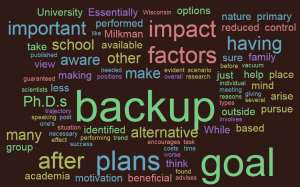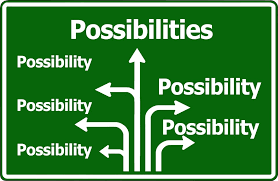By: Yaa Haber
While speaking to some post docs and fellow graduate students that are close to obtaining their PhDs, I have noticed a trend. Many of them initially considered academia as their primary outcome after graduate school and yet, lately, they are having second thoughts. Some of them are considering a backup plan in industry and other fields, but there is currently little information available as to whether these students may actually benefit from a backup plan. After performing some preliminary research, I have identified some reasons for and against backup plans and I share them below .
Perspectives for a Backup Plan
Natalie Lundsteen, the director of graduate career development at University of Texas Graduate School of Biomedical Sciences, describes her view of backup plans, particularly in academic careers, and supports them because these plans help to manage expectations. She strongly advises early career scientists to be realistic about their career choices. She encourages this based on the view that job opportunities for Ph.D.s are difficult to obtain at the last minute. She also suggests the importance of being aware of the challenges of a chosen career plan and preparing for these situations as they arise. In her eyes, the advantages of an alternate plan are:
- Less anxiety about the future
- Tenure-track positions are not guaranteed: many Ph.D.s don’t achieve one even after many years of work
- It is foolish to be single-minded about a career
Perspectives against a Backup Plan
Earlier this year, Milkman and Shin published a paper that shed some light on the downside of backup plans. After surveying 160 graduate students at the University of Wisconsin by giving them a scenario where they performed a task to earn a prize, they found that the group that was instructed that there was an alternative performed worse than the group that did not have the alternative option. They concluded the following:
- Having a backup in mind leads to reduced primary goal performance
- This reduction is not due to a dampening appeal of the goal
- Backup plans dampen the desire for the goal
Essentially these authors suggest that a main goal is less desirable when a backup plan is in place. Further, they theorize that our effort to pursue the goal is reduced when alternative paths are available. Essentially, as long as the goal requires effort, then a backup would diminish the effort required to achieve the goal. Conversely, they also posit that a backup plan is beneficial when the goal performance is largely dependent on factors outside of a person’s control. In this case, it is a good idea to think about possible scenarios that may arise, and have a plan of response in place.
Both of these arguments for and against a back-up plan are important for graduate students to be aware of. We should not make our decisions in a vacuum, but should take the time needed to weigh the costs of each decision. Additionally, making a backup plan is also dependent on the individual situation. If you are a planner by nature, it is important to consider all of the possibilities of a decision before making it. If you are by nature a risk-taker, then having a backup plan may not be necessary .
As I think about my own career trajectory, I find that it is important to make sure that I evaluate my career decision based on its impact on my family. What I do after graduate school does not just impact me, but also has consequences on my family . As such, I must make my decision with this in mind. While it is of interest that Milkman identified this effect of a reduction of motivation to pursue a goal amongst undergraduate students, it is evident to me that there are other factors at play when Ph.D.s consider their career path. I like the comment that backup career plans are beneficial when other factors are involved outside of one’s control. The acknowledgement of this phenomenon makes me aware that this decision is not so cookie cutter and involves several factors such as impact on others, types of backup options, and the impact of the overall goal. I believe that these factors are just as significant for affecting motivation to perform to achieve a goal as the decision to have a back-up plan.
If you are considering a career in academia and are not sure if having a backup plan is worthwhile, consider weighing the impact of your goal in addition to what options exist as it relates to a back-up.
- Will you achieve the same level of satisfaction with your back-up as your original goal?
- Are there steps you can take to ensure you meet success with your goal?
- What are the implications of not meeting your goal?
These are some important questions to help navigate the decision to have a backup plan .
Works Cited
- http://www.sciencedirect.com/science/article/pii/S0749597816302096
- https://www.insidehighered.com/advice/2016/09/12/pros-and-cons-backup-career-plans-essay?width=775&height=500&iframe=true
Additional Resources
- https://www.insidehighered.com/advice/2015/06/29/essay-need-new-phds-do-job-searches-more-dream-jobs
- https://www.mindtools.com/pages/article/newCDV_90.htm


